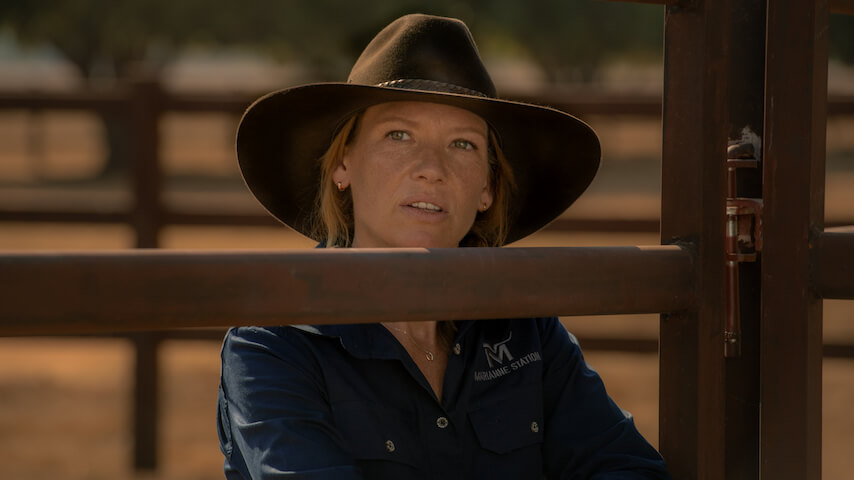Australian Western Territory is as bloody as it is soapy
The Netflix series tries to scratch Yellowstone fans’ itch for wide-open-spaces drama.
Anna Torv (Photo: Netflix)
In the 2006 Down Under-set The Proposition, a breakneck opening drops viewers into a frenzied gun battle. Within two minutes of the credits, a man takes one to the neck, bullet holes punctuate shanty walls like a colander, two barely-clad women slump unceremoniously dead, Guy Pearce’s character sits shackled and bloodied but stoic, his brother (shot and pistol whipped) sobs, flies buzz, holes are dug, and a British captain gazes at the sand and sun, wipes the greasy sweat from his forehead, and waxes: “Australia. What fresh hell is this?”
In Territory, we find ourselves very much in the same terroir as that Nick Cave-penned and John Hillcoat-helmed film. The so-called realm of “kangaroo Western” is a scrabby and rough-hewn place, a sweaty and horse- and croc-filled psychic latitude cousin to the world of Cormac McCarthy. (Hillcoat also directed the adaptation of McCarthy’s The Road.) An ominous score and opening voiceover confirms as much. “Everything is trying to kill you: the climate, the land, the animals.” The country has two seasons: “drought and flood.” Vultures hawk and cattle trample. Wide windswept vistas eventually give way to a close-up of a femur, popping bright red and Halloween-decoration-ish through thigh skin. Its owner, not long for this world, is quickly found and ravaged by a pack of wild dogs. The rather singular cold open trigger warning is not joking around: “Aboriginal and Torres Strait Islander viewers are warned that this series may contain images and voices of deceased persons.”
This world of steers and western shirts and cowboy hats and oh-so-much gristle introduces us to the Lawsons, the fifth-generation family owners of “Marianne Station,“ the biggest cattle empire in the world, one “the size of Belgium.” On said land, the everyday is marked by chasing down a wild bull with an archaic-jeep-looking contraption equipped with something like the world’s largest trash picker. When an unexpected death leaves the organization without a clear successor, the snaking family-tree tendrils of drunk sons, wayward grandsons, naive granddaughters, and maybe questionably motivated in-laws vie for a sort of controlling stake. Against them are a multitude of outside interests: rival cattle barons, gangsters, billionaires—all painted with varying shades of nefariousness. When one opines that “mining leases top everything—we keep the lights on for the entire world,” the path is clear to both the underhanded and shouting places this story is headed.
With such a shotgun-and-pickup-truck swagger, and a plot in conversation with season two of Fargo, Netflix seeks to get in on the wide-open-spaces itch of fans of Yellowstone, or Tulsa King, or whatever else Taylor Sheridan is cooking up under the expansive stars of his ranch. But it’s not long before the tough-guy-and-girl schtick runs a bit toward pulpy, ending frequently in the realm of soapy. And for stretches, it can read as downright sudsy, with a love story sparked around an awkward request to take iPhone vids of some sweet horseback-riding moves. A Road House-esque brawl is precipitated by the kind of bar entrance where you hop on your buddy’s back and jostle his hat down over his eyes and then start a for-fun quarrel with bottles smashed over heads. Some risky business involving stolen croc eggs ensues, a metaphor for an uncomfortable love triangle that is more than a bit eye-rolly.
But there are plenty of jaw-jutted and tough-bloke platitudes to sate the kind of Sunday-after-supper appetites where you sit on the front porch with a toothpick. “You callin’ me a liar?” “I’m callin’ you a lyin’ bastard.” “Respect is what matters.” “You remember who owns this place!” It’s a colorful cast of characters, ever angling, giving whispered oral contacts around the edges of formal soirees or sausages on the barbie. Familial trauma is hashed around a rural campfire, schemes are schemed. A real “bastard” of a patriarch belt-whips his addict son to tears after telling his other son’s corpse, “You were the best of ’em.”
As the sad-eyed cowpoke, passed over by his father, Graham Lawson (Patriot‘s Michael Dorman) has the repose and downtrodden glances that allude to the heart of a poet—or at least the good kind of really sad drunk. His sometimes loving wife, Emily (Mindhunter‘s Anna Torv), is the show’s beating heart. She both absorbs and deflects the misogyny and the familial mistrust, cooly working her own angles and taking the bull quite literally by the horns.
But through everything, Australia remains the main character here. The show is shot across the Northern Territory and South Australia (in Kakadu National Park and in a massive and functioning cattle station). All of it yields unparalleled wide-openness at once beautiful and forbidding, celestial and of a different time. There is a deep pleasantness in stepping entirely outside plot concerns to spend some time with the Indigenous community, who fish and bullshit and talk of walking “on the land” versus “with the land,” losing their boots because “you gotta feel the country so the country knows you.”
But, truly, beef in this world is king. So back to the good ol’ boys’ club we go, roiling and boiling with mistrust, bouncing from cattleman’s federation meetings to livestock auctions and the need to rejuvenate the gene pool with bulls with more ’tude. And here it’s not hard to see a parallel to our own country: a place mired and fragmented in frustrations, in stubborn identity stances, in inequality, and in an endless violence that seems to never really amount to anything but more.
Territory premieres October 24 on Netflix